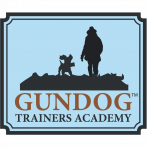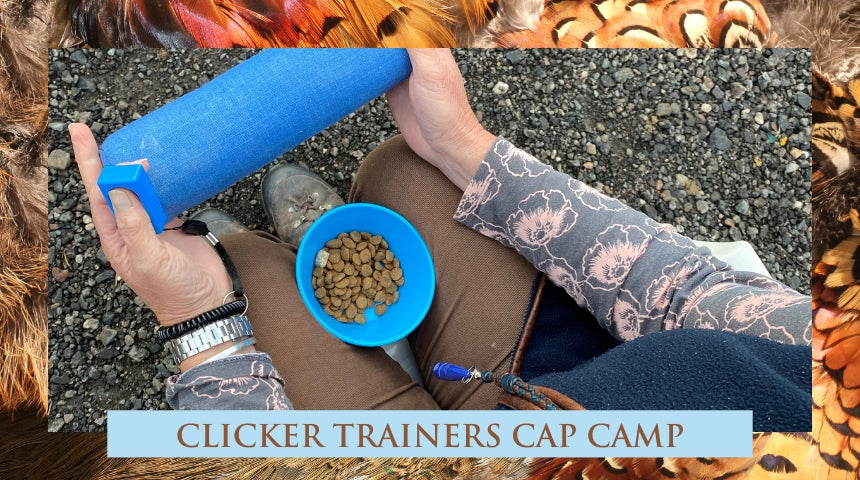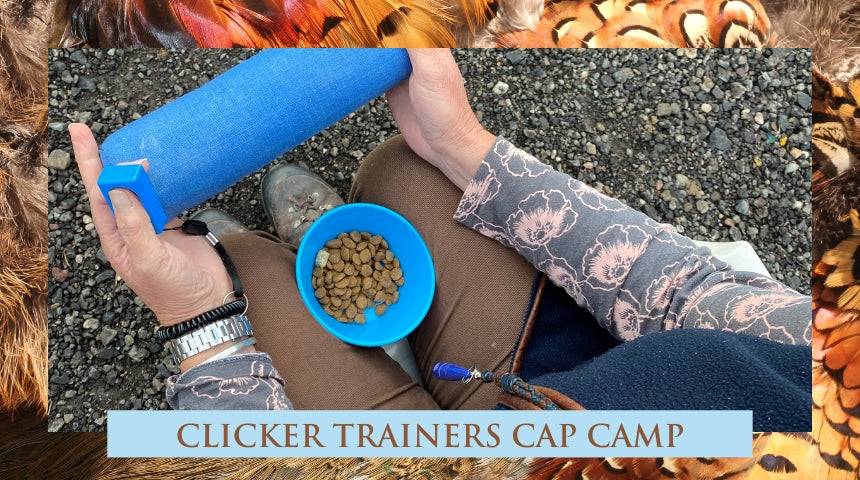A brand-new opportunity to learn and refine your clicker training skills and work towards the Clicker Trainers Competency Assessment Programme (CAP) Level 1, 2, or 3 in a supportive, practical environment.
This five-day training week is open to all dog trainers who would like to develop their clicker training skills. We welcome all breeds and handlers of all levels - whether you have just started training with your first dog for fun, or are a professional dog training instructor, the camp is ideal for both dedicated hobbyists and those working in the dog training industry.
With just 10 handler places available, each participant will receive focused coaching and constructive feedback to help them pass the assessment criteria at the end of the week with confidence.
We welcome those involved in all dog training activities (e.g. agility, showing, gundogs, heelwork to music, obedience, rally, scentwork, hoopers, mantrailing, and more).
The camp will be perfect for you whether you are looking to deepen your understanding of clicker training, are working towards your GTA and ABTC accreditation, or would like to enjoy a week immersed in skill-building with your dog.
If you’re passionate about dog training and want to deepen your skillset as a clicker trainer, we’d love to welcome you to our first-ever CAP Camp.
The 2025 Clicker Trainers CAP Camp will take place at Kemble's Field near Pershore and Evesham. The dates for 2025 are as follows:
- Monday 18th to Friday 22nd August 2025
The camp is held at Kemble's Field, Charlton, Worcestershire, WR10 3LQ. The purpose-built dog training facilities include a large indoor training area with classrooms, toilets and a kitchen. Outside, there is everything you could want for dog training, including retrieving lanes, a jumping pen and fences, a large pond for water work, short grass and cover crops.
Hardstanding camping, with and without electric, is available on site and can be booked directly with Kemble's Field. Please email hello@kemblesfield.co.uk for details.
Who is this Clicker Trainers CAP camp for?
This week is designed for:
- Total beginners who are looking to get started and complete CAP 1.
- Anyone who has completed CAP 1 and is ready to pursue CAP 2.
- More experienced trainers who are progressing to CAP 3.
- Those requiring CAP 1 to join the GTA Teacher's Course.
- Those requiring CAP 2 to become GTA-accredited instructors.
- GTA-accredited instructors who gained accreditation before the CAP requirements, who would now like to upskill and gain some CPD points.
The CAP Camp is an excellent opportunity to refine your technique, ask questions, observe others, and work through any sticking points with the guidance of skilled instructors.
Assessment and Certification
On the final day of the camp, participants will have the opportunity to be assessed for CAP 1, 2 or 3. You’ll work at your own pace throughout the week to prepare for this, supported by feedback and coaching to help you present your best work.
Assessments focus entirely on the trainer’s skill, and dogs are never under test. The behaviours chosen can be tailored to suit the dog and environment, allowing trainers to showcase their ability to apply clicker training principles thoughtfully and ethically.
If you wish to be assessed after the course has ended there will be a £25 assessment fee which includes a certificate.
What is the Clicker Trainers Competency Assessment Programme (CAP)?
The Clicker Trainers Competency Assessment Programme (CAP) was developed by Kay Laurence at Learning About Dogs, and it is with her permission that we assess our students and award certificates of Pass, Merit or Distinction.
Clicker training is a powerful and nuanced method of teaching, but simply using a clicker does not automatically make someone a skilled clicker trainer. The CAP system exists to provide both a clear learning pathway and a way to self-certify competence based on skill, observation, self-awareness and the ability to tailor training to each individual dog.
CAP Foundation Level 1 assessment criteria:
This level assesses the basic skills of handling the rewards, clicker, lure and target stick/hand as well as the trainer’s ability to communicate with the dog without coercion, their observation and decision-making skills. Trainers would be expected to be able to add cues to behaviours and have shaped and lured simple behaviours.
- Handle food rewards safely and efficiently.
- Deliver food rewards from hand or pocket.
- Deliver from a reserve kept off the handler.
- Operate the clicker in either hand with a non-visual movement.
- Give reasons for their choice of reward.
- Attach a verbal cue to a behaviour without supporting body language.
- Give a cue without excessive body language or unnecessary repetition.
- Have taught the dog to respond to the cue without excessive hesitation.
- Use a target stick or target hand, clicker and rewards and deliver food effectively.
- Have taught the dog to focus on the target and respond promptly to the target cue.
- Give the click appropriately to effectively communicate the rewarded behaviour.
- Withhold the click to gradually extend the duration of a behaviour.
- Deliver the reward with fluency and good timing to encourage further learning
- Free shape a behaviour that is interaction with a new object without giving the dog assistance from verbal or visual cues.
CAP Novice Level 2 assessment criteria:
CAP 2 requires a deeper fluency in key behaviours, including reliable cue attachment, shaping without luring or prompting, and maintaining quality across locations and distractions. This level assesses the trainer’s ability to secure a solid foundation in achieving a consistent quality and reliability to cue and develop more complex behaviours in free shaping.
- Have taught a behaviour through targeting where the target has been faded.
- Have transferred a targeted behaviour to a new target or cue.
- Have achieved and maintained fluency in at least 3 behaviours
- Have achieved and maintained a consistent quality in at least 3 behaviours
- Have maintained a consistent standard of 3 behaviours in different locations
- Have maintained a consistent standard of 3 behaviours with distractions
- Can attach a verbal cue to a behaviour where the body language is variable
- Can attach a visual cue to a behaviour where the body language is variable
- Can change the cue attached to a behaviour.
- Can demonstrate the behaviour does not happen unless cued.
- Can use a different reward.
- Can shape a new behaviour that is a physical movement without luring or targeting
- Can free shape a behaviour that is interaction with a new object without giving the dog assistance from verbal or visual cues.
- Can continue with the free shaping by adding a physical movement to the interaction without giving the dog assistance from verbal or visual cues.
CAP Intermediate Level 3 assessment criteria:
For this level, the assessor will be looking for different collections of compound behaviours, advanced shaping and evidence of data collection and analysis.
- Use a single cue to chain at least 3 individual behaviours where a reward is only given on completion of the chain.
- Maintain the quality of each behaviour within the chain (above).
- Chain (sequence) at least 6 individual behaviours where each individual behaviour is cued and reward is only given on completion of the chain.
- Maintain the quality of each behaviour within a chain (above).
- Merge at least 3 behaviours that occur simultaneously into one new behaviour.
- Collect data demonstrating progression of learning and analyse the results.
- Have free shaped a new complex behaviour without overtly directing the learning.


